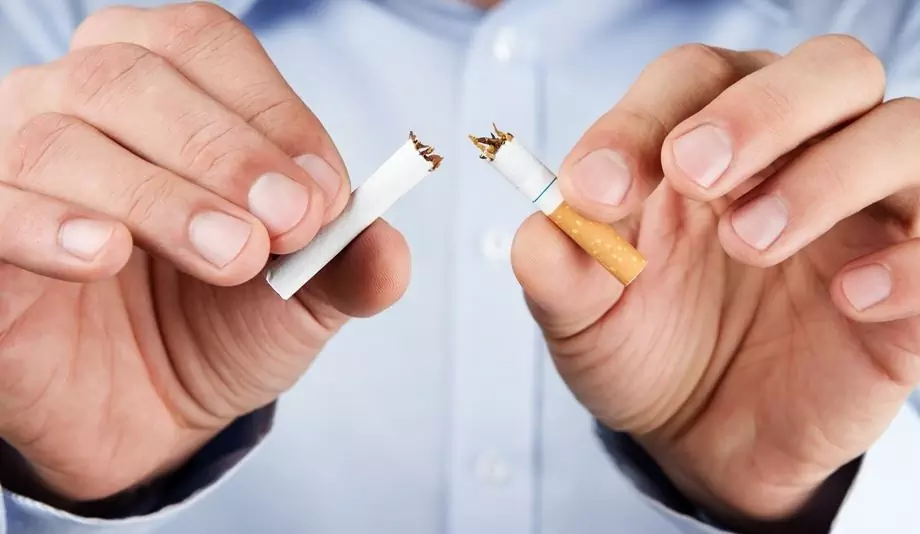- Author Rachel Wainwright wainwright@abchealthonline.com.
- Public 2023-12-15 07:39.
- Last modified 2025-11-02 20:14.
Treatment of angina in adults: how to treat angina effectively and quickly
The content of the article:
- General principles for the treatment of angina
-
Drug therapy
-
Antibacterial drugs
- Amoxiclav
- Sumamed
- Ceftriaxone
- Means used as part of complex treatment
-
- Inhalation
- Rinses
- Folk remedies
- Video
Treatment of angina should be prescribed by a doctor after determining its type and severity of the course. This allows you to shorten the recovery time, prevents the transition to a chronic form and the development of complications.
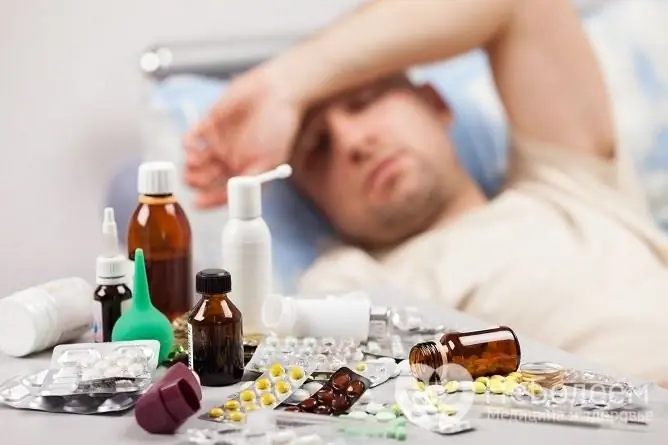
Most often, angina can be treated at home in compliance with all the doctor's recommendations
Angina, or acute tonsillitis, is an infectious disease in which the inflammatory process affects the tonsils of the pharyngeal ring. In most cases, treatment is carried out at home. The patient is placed in a hospital in the presence of concomitant severe chronic diseases or suspicions of complications.
The causative agent of sore throat is most often the bacteria staphylococcus or streptococcus. Also, the inflammatory process can develop as a result of infection with viruses (coronaviruses, enteroviruses, influenza viruses). Less often, fungi from the genus Candida can provoke a sore throat.
The development of tonsillitis can be influenced by chronic diseases, hormonal imbalances, the functioning of the immune system, frequent hypothermia or difficult working conditions.
The disease begins abruptly, with a general deterioration and an increase in body temperature to 38-39 ° C. The patient develops sore throat and discomfort, which are subsequently replaced by painful sensations that increase when food or saliva is swallowed.
In this case, regional lymph nodes can become inflamed, pain in muscles and joints can occur. General health worsens, drowsiness and headache appear, appetite disappears.
General principles for the treatment of angina
Treatment should be carried out by an otolaryngologist. In order to get rid of sore throat and prevent the development of complications, you must adhere to the following rules:
- observe bed rest. The disease transferred to the legs very often leads to complications in the kidneys and heart. Physical and emotional stress should be avoided. The patient is a source of infection, therefore, he can infect others;
- observe the drinking regime. A large amount of liquid used allows you to quickly get rid of intoxication. It is better to drink tea with lemon, fruit drink, dried fruit compote, still mineral water. The liquid temperature should be at room temperature;
- monitor the microclimate and cleanliness in the room. Dry and hot air has a negative effect on irritated mucous membranes; therefore, a humidifier must be used in the patient's room. It is also recommended to regularly carry out wet cleaning and ventilate the room in order to avoid the accumulation of pathogenic bacteria that are released along with cough and saliva into the air;
- control body temperature. If it rises to 38.5 ° C and above, antipyretic drugs must be taken. If the temperature has not reached this mark and the patient feels normal, it is not necessary to bring it down, as this allows the body to fight the infection.
Drug therapy
Antibacterial drugs
If bacteria are the causative agent of the disease, broad-spectrum antibiotics are used to cure angina quickly and effectively. To determine the sensitivity to the effects of these drugs, a special analysis is carried out. To do this, take a swab from the throat. The drug itself, the regimen and the duration of treatment are determined by the doctor.
Amoxiclav
Amoxiclav is very often prescribed for the treatment of angina in adults and children. The drug belongs to the group of penicillins and contains amoxicillin and clavulanic acid. It is released in the form of tablets and suspensions. It is a semi-synthetic antibiotic that is active against gram-positive and gram-negative microorganisms, including streptococci and staphylococci.
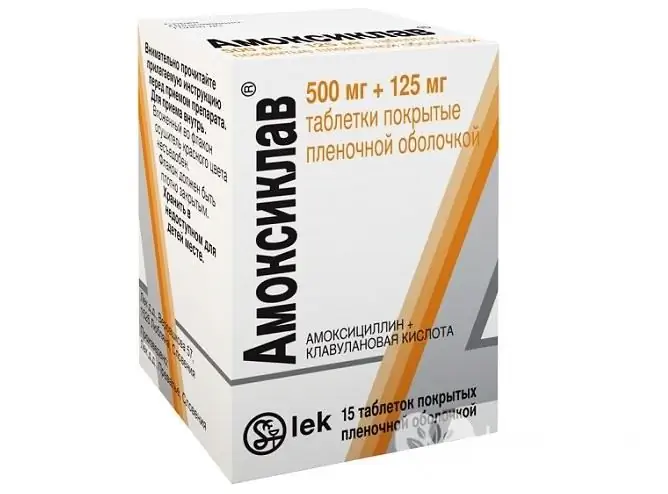
Amoxiclav is used for angina in adults and children
The dose of the drug depends on the severity of the inflammatory process. For women during pregnancy and nursing mothers, medication is prescribed only if the benefits outweigh the potential harm.
Analogues of Amoxiclav are: Amoxil K, Augmentin, Flemoklav Solutab, Rapiklav.
Sumamed
The active ingredient of the drug is azithromycin. It is a broad-spectrum antibiotic that belongs to the macrolide group. The advantage of this remedy is that it must be taken once a day. The duration of treatment is 3 to 6 days.
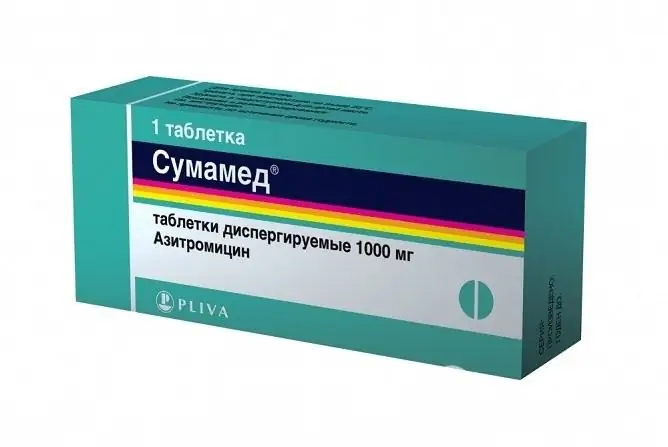
Sumamed is an antibiotic often prescribed for angina
Sumamed's analogs are: Azithromycin, Azimed, Azitro, Ziomycin, Zitrox.
Ceftriaxone
The drug belongs to the group of cephalosporins and has a wide spectrum of action. It copes with most gram-positive and gram-negative microorganisms. Most often, the drug is prescribed in the form of intramuscular injections. Previously, the powder is diluted with saline, water for injection, Novocaine or Lidocaine.
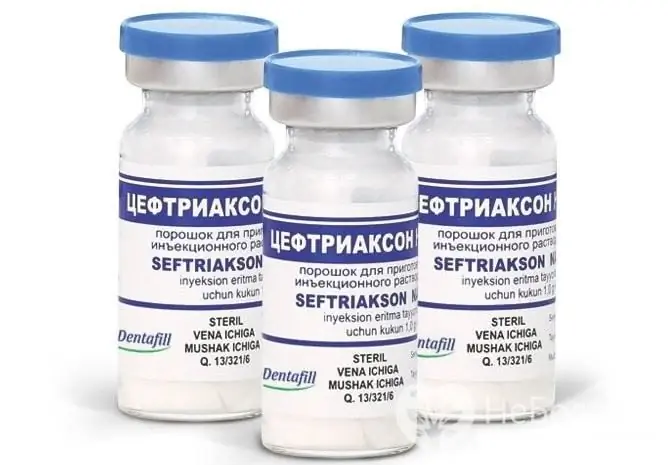
Ceftriaxone is an antibacterial drug used to treat angina
The analogs of Ceftriaxone include: Emsef, Efmerin, Rotacef, Loraxon.
Means used as part of complex treatment
In addition to antibiotics, preparations are prescribed to restore the intestinal microflora: Enterojermina, Linex, Enterol. They not only prevent the development of side effects from the gastrointestinal tract, but also help to strengthen the immune system.
In the complex treatment of angina, non-steroidal anti-inflammatory drugs based on paracetamol, ibuprofen or nimesulide are also used. They have an antipyretic effect and can also reduce pain. These medications are taken 2-3 times a day or as needed. Children under 12 years of age are not recommended to use drugs that contain nimesulide or acetylsalicylic acid.
Antiseptics can help reduce severe sore throat and inflammation. Most often they are released in the form of tablets or lozenges for resorption: Strepsils, Septolete, Lisobakt, Lizak. They may contain chlorhexidine or various herbal extracts. Antiseptics are also produced in the form of aerosols for irrigating the throat.
Inhalation
Inhalations are prescribed in the complex treatment of the disease in order to moisturize the mucous membrane, reduce pain and increase local immunity. The procedure is carried out using a special inhaler (nebulizer) or by inhaling warm steam over a container with water or medicinal decoction.
For steam inhalation, you can use tools such as:
- decoctions of medicinal plants (chamomile, sage, oak, calendula, lavender, mint). A small amount of dry raw materials are poured with boiling water and cooled to 45 ° C. The patient breathes in warm steam by leaning over the container and covering himself with a towel;
- alkaline saline solution. In 1 liter of hot water, dissolve one teaspoon of baking soda and sea salt. The procedure is carried out for 10-15 minutes.
Warm-wet inhalations must be carried out with caution, as inhaling too hot steam can burn the mucous membrane, which will lead to a worsening of the condition. Such procedures at elevated body temperature are not recommended.
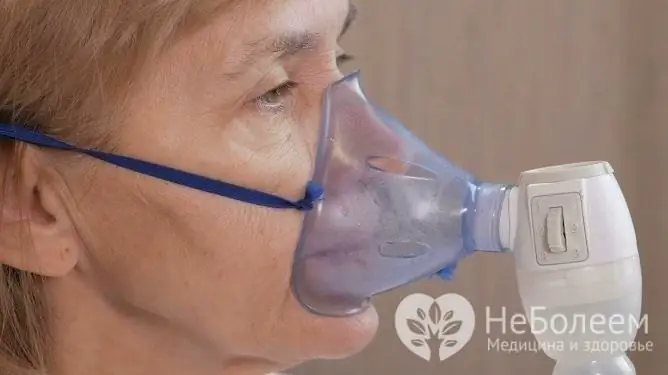
As part of the complex treatment, inhalations are prescribed, including with the help of a nebulizer
With the help of a nebulizer, drugs are injected into the body that act directly in the area of inflammation. For treatment use:
- Dekasan. The active ingredient of the drug is decamethoxin. It belongs to the group of antiseptics and disinfectants. It has antimicrobial and antifungal properties. Before use, Dekasan is diluted with saline;
- Dioxidine. The drug is classified as a broad-spectrum antibacterial agent. It affects staphylococcus and streptococcus, which in most cases are the cause of the development of purulent sore throat. When applied topically, it is safe. As well as Dekasan, before inhalation, Dioxidin is diluted with saline;
- Chlorophyllipt alcohol. This is a herbal tincture, which allows you to increase local immunity, has a mild analgesic effect and actively fights against staphylococcus;
- Borjomi. Alkaline mineral water helps moisturize the mucous membrane and reduce the intensity of the inflammatory process.
Before starting treatment, you need to carefully study the instructions for the nebulizer. In most cases, it is not recommended to use decoctions and infusions of medicinal plants, as well as essential oils for inhalation with this device. Also, you can not dilute drugs with ordinary boiled water, as this can lead to the development of bronchospasm.
Rinses
Gargling can help reduce inflammation in the throat. For these purposes, infusions of medicinal herbs are used: mint, lemon balm, sage, calendula, chamomile. In order to prepare them correctly, a small amount of raw materials is poured with boiling water and allowed to brew. Then filter and rinse the throat 3 to 7 times a day.

One of the effective methods of therapy is rinsing the oropharyngeal cavity
An alcoholic solution of calendula, propolis or chlorophyllipt can also be used, which is previously diluted in warm water. The procedure is carried out 3-4 times a day until the symptoms of the disease recede.
A fairly popular remedy for the treatment of angina in adults is a salt solution with baking soda (half a teaspoon per 200 ml of warm water). To enhance the effect, add 2-3 drops of Iodine to it.
Folk remedies
How to treat angina at home? Traditional methods are used as part of the complex therapy of the disease in addition to drug therapy. With the help of folk remedies, you can somewhat reduce pain, relieve inflammation and alleviate other symptoms of the disease. These methods are quite safe and can usually be used with breastfeeding.

Honey is often used to treat tonsillitis with traditional medicine.
For the treatment of sore throat, you can use honey or propolis. These agents have anti-inflammatory and antibacterial effects. In the complex therapy of the disease, the following are used:
- rapeseed honey. Half a teaspoon of honey is absorbed every hour. Such a remedy is effective at the initial stage of the disease and helps to quickly get rid of tonsillitis;
- a product based on honey, butter and soda. Melt 50 g of honey and butter in a water bath, then add 2 g of baking soda and stir quickly until foam appears. Store the medicine in the refrigerator, take half a teaspoon before meals three times a day. The product helps to soften the throat, relieve pain and relieve inflammation;
- aloe and honey based product. Using a blender, 300 g of aloe leaves are turned into a homogeneous gruel, the same amount of honey is added to it and poured with wine. After the remedy has been infused for a week, it is used to treat chronic tonsillitis, one teaspoon three times a day.
If you do not start the treatment of angina in adults and children in time, it can become chronic, then unpleasant symptoms will appear regularly. Also, tonsillitis is dangerous because it often leads to complications in the heart, kidneys and joints. Therefore, when the first signs of the disease appear, it is necessary to seek help from an otolaryngologist.
Video
We offer for viewing a video on the topic of the article:

Anna Kozlova Medical journalist About the author
Education: Rostov State Medical University, specialty "General Medicine".
Found a mistake in the text? Select it and press Ctrl + Enter.


